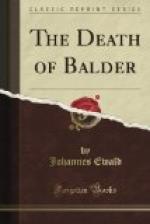HERTEDAL, the place in Sielland where Herte’s grove was.
Hothbrod, the father of Hother, according to Saxo, who makes him king of Sweden, and thus Hother a Swede. Contrary to which, the author of this piece found himself justified in reckoning Hother amongst the Skioldungs.
Hother, according to Saxo, was king of Denmark and Sweden; but his Life, by the same, is a chain of fables, which has yet given considerable occasion to the contents of this piece.
Leire, the ancient place of residence of the Danish kings, whence they were termed “Kings of Leire.”
Lidskialf, in the Edda Klidskialf, a place in Asgard from which Odin surveys the whole world.
Loke, a very wicked god, who, according to the Edda, was the cause of the death of Balder, and was therefore conducted by the other gods to a cavern, where they chained him to three rocks, there to suffer the most painful punishment until the destruction of the world. By the giantess Angerbode he begot Fenri’s Wolf, Midgard’s Serpent, and Hael. He was reckoned among the Aser, and was, notwithstanding his wickedness, beautiful of appearance.
Midgard’s serpent, a serpent begot by Loke with the giantess Angerbode. It was to be one of the occasioners of the world’s destruction, and was on that account cast by Odin into the deep sea, where it grew to such a degree that it lay round the whole earth, and bit its own tail.
Mimmer, the owner of a fountain wherein wisdom and knowledge of the future lay concealed, out of which he drank every morning. Odin was once obliged to lay one of his eyes in pawn, in order to obtain a draught from this fountain. He was likewise, when Surtur should attack the gods, to ride to this fountain and seek counsel from Mimer on his own and his army’s account.
Mimring, this is the sword called here, which Hother, according to the relation of Saxo, took from a satyr or wild man of the same name.
Nanna, daughter of Gevar, beloved by Hother, and by Balder, son of Odin, according to Saxo, whose narration bears that Hother wedded Nanna, and afterwards slew Balder by the assistance of an enchanted belt which three nymphs had bestowed upon him.
Nastroud, was properly the place where the ungodly were to be after the destruction of the world, but here the word is intended to signify the glowing and burning world towards the south, at whose extremest end Surtur had his habitation, and which is called in the Edda, Muspel, or Muspelheim.
NORNIES, were the goddesses of destiny, whose messages Odin himself was compelled to fear and to attend to. They were three in number. But the eldest, Urd (been), presided over the past; the second, Verande (being), the present; and the youngest, Skuld (shall be), the future.
Odin, the god of war, the most exalted of the gods, and father of them all.




